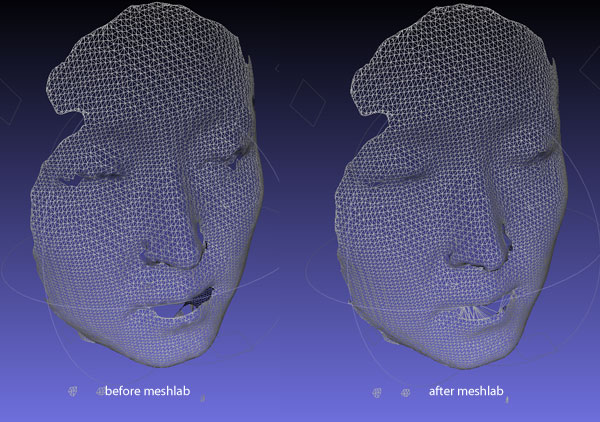MAS 863: How to Make (Almost) Anything
1) connect the hardware part to power source and computer (with a converter)
2)
open the software, choose "calibrate", and scan the calibration board, until the software indicates it's done.
3) scan the dots: there are two ways to scan the dots. Poeple could scan a board with retroreflective dots on it, or put dots directly on the 3D object that will be used for scanning later. Make sure all the dots are properly captured in the software.
4) scan the surface: scan the 3D object with dots on itself anywhere, or scan the 3D object without dots on top of the board with scanned dots.
5)"optimize" the surface in the software
Meshlab was used to re-construct the surface and fill the holes at the end. It can handle small holes pretty well. But we should prevent big holes from happening.




I used an open source application based on Kinect to scan and capture the face. It's super easy, nothing to explain in terms of using the software.
Download:
KinectToStl
If you don’t want to deal with compiling it, there’s also an OSX app available




This was done during a work shop held by Aaron Koblin.
1) For the hardware, you need a projector and a camera. Project projects three strips patter each time, while 3 pics are captured.
During the capturing, the 3D object shouldn't move, and both camera and projector should stay in the same position, the room needs to be dark as well.
2) The software is written in processing. It includes sample images as well.
Links:
on line tutorial with software downloadable




1) Generating the soundwave
Minim Audio library in Processing could help to generate sound wave of human voice. I generated two sound waves of the word "open" and "love" seperately, and save the wave using the fuction of "save frame".
2) Build the 3D model
I buit the 3D model in Rhino based on the sound wave.
3) Recognize the model in digital world
Haven't done yet. Idea is, the form could represent the function which was spoken when the sound wave was generated.
For exaple, the word"love" generate a soundwave, and the physical model of the soundwave can be recognized by cellphone, and say a heart back on screen.
Download:
-
Processing Code to generate the Sound Wave



